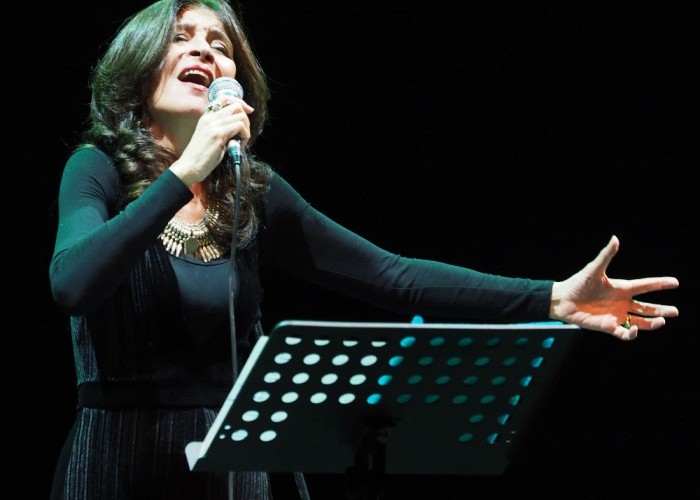Dec 9, 2025 12:28 PM
In Memoriam: Gordon Goodwin, 1954–2025
Gordon Goodwin, an award-winning saxophonist, pianist, bandleader, composer and arranger, died Dec. 8 in Los Angeles.…

Maria Pia De Vito’s embrace of the Portuguese language has resulted in the singer making connections between seemingly disparate musical traditions.
(Photo: Courtesy Umbria Jazz)What are the qualities of Chico Buarque’s music that resonate with you?
First of all, his way of composing is very original. He goes from a very sophisticated thing to simple sambas, and on top of it, there is this beautiful poetry, as I say; owning the language.
His father was a sociologist, who wrote a very important book, Roots Of Brazil. He’s very well-read; his poetry is amazing. It’s also amazing that he can sing something like “Construção,” about the death of a person who falls down from a construction site, or something like “Você, Você,” the Oedipal song where a man is jealous of this woman and says: “Where are you going? What’s happening at night? When are you coming back?”—and instead, it’s the kid who hears in the night the parents making love.
Or “O Meu Guri,” which is the incredible story of a single mother in a favela—which you realize through the narrative—who has a kid by herself, and she doesn’t even know how she raised him. And this kid, in time, becomes a little thief, and she doesn’t realize. He comes back home and brings her a purse with a wallet inside, and she says, “Oh, he’s so good; he brings gifts to me, so many golden colors.” She’s unconscious of what’s going on. Then he appears in a picture on a newspaper, and naturally it’s the worst possible scenario. She doesn’t understand even then. She says, “Look at him; why are people making such a fuss? He’s so cute in this picture.”
Do you delve that deeply into the narrative of everything you sing?
That’s what I need to do. I spent the first 10 years of my jazz career in clubs, singing bebop, learning the Charlie Parker songbook and improvising, improvising, improvising. On the other hand, there was my melodic Neapolitan roots, which came out naturally. My approach was to play with the sounds while singing through the form.
There was a big transformation when I was 34. I did a recording called Nauplia with Rita Marcotulli, investigating Neapolitan roots and improvising on them with modern harmony. I realized that I had enclosed the 13 languages, all my earlier experiences, in a box. So, in returning to that primal sound of Neapolitan, it gave me two voices, and I started a process of synthesizing the two things.
I’ve been a bit crazy. I never thought in terms of career, but what I needed to learn. Each record is a step where I hopefully get closer to the authentic. I always think about Monk, who said the genius is the one that most resembles himself or herself. I think that the important thing is to be sincere, honest. Sometimes you want to do something musically, and then you realize that you’re trapped in a frame, that it’s more a performance of virtuosity—and I am not interested in that any more.
I wanted to ask about carving out an artistic path as a female musician in Italy. I imagine you’ve endured patriarchal admonitions.
I could never stand somebody telling me what to do, musically.
But I’m sure some have tried.
I decided to take my time. When I say I didn’t think in terms of career, it’s that I was not looking for somebody to discover me. I was looking to discover my own way. I decided to sing jazz, because I wanted to improvise. I’ve always thought as an instrumentalist, and my maximum idea of fun was to be in a peer-to-peer position with the musicians. That approach defended me from the worst possibility of being a singer in a world that is male-dominated. Nowadays, with so many woman instrumentalists, it’s different.
It also helped that I met Rita when we were 22, 23. Rita was so good that she gained respect by the fact that what she was doing was the real stuff. I tried to do the same.
So, I always, since the beginning, went to a gig saying, “OK, I sing this in the original; this is how I want to do things, and these are the chords.” I never depended on someone else. I think that’s the best self-defense—and the respect of my fellow musicians. That’s been my strength all these years. DB

Goodwin was one of the most acclaimed, successful and influential jazz musicians of his generation.
Dec 9, 2025 12:28 PM
Gordon Goodwin, an award-winning saxophonist, pianist, bandleader, composer and arranger, died Dec. 8 in Los Angeles.…

Belá Fleck during an interview with Fredrika Whitfield on CNN.
Jan 13, 2026 2:09 PM
The fallout from the renaming of the John F. Kennedy Center for the Performing Arts to include President Donald…

The success of Oregon’s first album, 1971’s Music Of Another Present Era, allowed Towner to establish a solo career.
Jan 19, 2026 5:02 PM
Ralph Towner, a guitarist and composer who blended multiple genres, including jazz — and throughout them all remained…

Peplowski first came to prominence in legacy swing bands, including the final iteration of the Benny Goodman Orchestra, before beginning a solo career in the late 1980s.
Feb 3, 2026 12:10 AM
Ken Peplowski, a clarinetist and tenor saxophonist who straddled the worlds of traditional and modern jazz, died Feb. 2…

Rico’s Anti-Microbial Instrument Swab
Jan 19, 2026 2:48 PM
With this year’s NAMM Show right around the corner, we can look forward to plenty of new and innovative instruments…